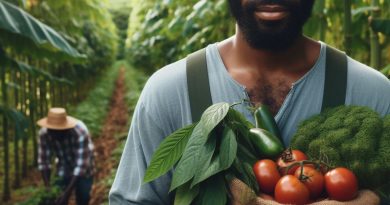From Conventional to Organic: A Farmer’s Tale
Last Updated on February 22, 2024
Introduction
As we explore “Farmer Conventional to Organic” we can appreciate the dedication, hard work, and determination required to embrace organic farming.
Farmers face numerous challenges when transitioning from conventional to organic farming.
This blog post aims to provide a brief explanation of this transition, highlight the challenges faced by farmers, and emphasize the importance of sharing a farmer’s perspective on this topic.
Shifting from conventional to organic farming involves a significant change in agricultural practices. Farmers must adopt sustainable methods that do not rely on synthetic chemicals or genetically modified organisms.
Farmers encounter numerous obstacles during the transition. They must learn new techniques for pest and weed control, which often require more labor-intensive practices.
Additionally, organic crops may yield lower and be more susceptible to diseases, impacting farmers’ livelihoods.
Understanding the challenges faced by farmers during this transition is crucial.
It also allows consumers to make more informed choices, supporting sustainable agricultural practices.
Transitioning from conventional to organic farming is a complex and demanding process. Farmers confront various challenges, learning new methods and adapting to potential yield fluctuations.
By sharing their perspective, we can foster appreciation for their efforts and promote sustainable agriculture.
Reasons for Transition
In this section, we will explore the reasons why farmers decide to transition from conventional farming practices to organic farming.
Encountering health issues related to conventional farming practices
- Farmers may experience various health issues, such as respiratory problems, due to exposure to synthetic chemicals.
- Prolonged use of chemical fertilizers and pesticides can have detrimental effects on the overall well-being of farmers.
- Skin irritations, allergies, and even chronic illnesses are often linked to the use of chemical-intensive farming methods.
Concerns about environmental sustainability
- Conventional farming practices contribute significantly to soil degradation and erosion.
- The excessive use of chemical fertilizers and pesticides pollutes water sources and harms aquatic ecosystems.
- The loss of biodiversity and destruction of natural habitats are also alarming consequences of conventional farming.
Growing demand for organic products
Consumer awareness regarding the benefits of organic products has been steadily increasing in recent years. Farmers recognize the economic advantages of catering to this rising demand for organic goods.
The organic market has shown consistent growth, offering farmers a profitable alternative to conventional farming.
Realization of long-term benefits of organic farming
- Farmers understand that organic farming methods promote soil fertility and long-term sustainability.
- Organic practices, such as crop rotation and composting, enhance soil structure and nutrient content.
- Reduced reliance on synthetic chemicals improves the overall health of the soil, resulting in higher crop yields.
- Organic farming helps combat climate change by sequestering carbon in the soil and reducing greenhouse gas emissions.
- Crop diversity and biological pest control methods help farmers mitigate risks associated with climate variability.
In short, farmers transition from conventional to organic farming due to health concerns, environmental sustainability, the growing demand for organic products, and the realization of long-term benefits.
This shift is crucial for the well-being of both farmers and the environment.
Read: 21st Century Farmers: Youth at Agriculture’s Forefront
Planning the Transition
Researching organic farming methods and practices
One of the first steps in transitioning from conventional to organic farming is to conduct extensive research on organic farming methods and practices.
This involves studying and understanding the principles, techniques, and requirements of organic agriculture.
Researching organic farming methods and practices is crucial as it provides farmers with valuable knowledge and insights into sustainable and environmentally friendly farming practices.
It enables farmers to learn about organic soil management, natural pest control, crop rotation, and biodiversity conservation.
By gaining knowledge about organic farming methods, farmers can make informed decisions about their transition and choose the most suitable techniques for their specific crops and farming conditions.
Research also helps farmers understand the potential challenges and risks associated with organic farming, allowing them to prepare and mitigate these issues accordingly.
Developing a transition plan with specific goals and timeline
Once familiar with organic farming methods, farmers need to develop a comprehensive transition plan. This plan outlines specific goals and objectives for the transition and establishes a timeline for achieving them.
A transition plan helps farmers organize their efforts and resources effectively.
It includes a step-by-step guide for implementing organic practices on the farm, such as transitioning from synthetic to organic fertilizers or implementing organic pest management strategies.
The plan should also include measurable goals and targets to track progress during the transition process.
This could include targets for reducing the use of synthetic chemicals, increasing soil organic matter, or achieving organic certification within a certain timeframe.
Establishing a network of support from experienced organic farmers
Transitioning to organic farming can be a challenging journey, especially for farmers who have limited experience in organic agriculture.
To overcome these challenges, it is essential to establish a network of support from experienced organic farmers.
Connecting with experienced organic farmers provides valuable guidance, advice, and mentorship throughout the transition process.
They can share their knowledge and experiences, recommend best practices, and provide practical solutions to common challenges faced during the transition.
An organic farming network can be established by joining local organic farming associations, attending industry conferences and workshops, or participating in online forums and communities.
These connections also provide opportunities for farmers to collaborate, share resources, and access organic markets.
Obtaining necessary certifications and permits
- Before fully transitioning to organic farming, farmers must obtain the necessary certifications and permits to label their produce as organic.
- Certification requires compliance with strict organic standards and regulations.
- Farmers need to work closely with certifying bodies or agencies responsible for organic certification in their region.
- They must complete the application process, which involves providing detailed information on farming practices, previous land use, and documentation of organic inputs used.
- Obtaining organic certification assures consumers that the farmer is following verified organic practices and allows them to access premium organic markets.
- It also requires farmers to undergo regular inspections and annual renewals to maintain their certification status.
In essence, transitioning to organic farming requires researching methods, creating a detailed plan, establishing support, and obtaining certifications.
These steps are crucial for a successful transition and ensuring the long-term sustainability and profitability of the organic farm.
Read: Artists to Agro: Creative Minds on Farms
Challenges Faced
Dealing with the initial skepticism and resistance from fellow farmers
- Explaining the benefits of organic farming to fellow farmers was met with skepticism.
- Many farmers were resistant to changing their conventional farming methods.
- Overcoming their doubts and convincing them of the long-term benefits was a challenging task.
- It required patience, persistence, and providing evidence from successful organic farming examples.
- Building trust and relationships with fellow farmers was crucial for their acceptance.
- Sharing personal experiences and success stories played a significant role in changing their perspectives.
Learning and adapting to new farming techniques and approaches
- Transitioning from conventional farming methods to organic required a steep learning curve.
- Farmers had to educate themselves about organic farming practices and principles.
- Understanding the impact of soil health, crop rotation, and natural pest control methods became necessary.
- Training programs, workshops, and expert guidance were sought to acquire the necessary knowledge and skills.
- Implementing these new techniques required continuous monitoring and adjustments.
- Sharing experiences and lessons learned with other farmers helped in collective learning and improvement.
Managing pest and weed control without conventional chemical inputs
- One of the biggest challenges faced in organic farming was controlling pests and weeds without chemicals.
- Farmers had to implement integrated pest management strategies and use natural predators.
- Crop rotation, companion planting, and physical barriers were employed to deter pests and weeds.
- Regular scouting and early detection of pests helped prevent large-scale infestation.
- Experimentation with different organic sprays and solutions became necessary to combat specific pests.
- Collaboration with local agricultural universities and research institutions provided valuable insights for pest control.
Financial burdens associated with the transition
- Transitioning to organic farming required significant financial investment upfront.
- Farmers needed to purchase organic seeds, compost, and natural fertilizers.
- Additional labor and equipment were sometimes required for manual weed control.
- The initial yield might be lower during the transition period, resulting in potential income loss.
- Applying for grants and subsidies available for organic farmers helped alleviate some financial burdens.
- Setting realistic expectations and budgeting for the transition period were crucial to managing finances.
Overall, transitioning to organic farming posed challenges like convincing fellow farmers, acquiring new skills, managing pest control, and financial burdens.
Despite obstacles, organic farming’s benefits – enhanced soil health, biodiversity, chemical-free produce – motivated farmers to embrace the movement, overcoming challenges.
Read; Chefs in Fields: Culinary Pros Go Farming

Overcoming Challenges
Building relationships with other organic farmers for guidance and advice
Transitioning from conventional to organic farming is not an easy task. It requires a lot of knowledge and support from experienced organic farmers.
Building relationships with other organic farmers can provide valuable guidance and advice throughout the journey.
In the process of building relationships with fellow organic farmers, I attended conferences, workshops, and farmer’s markets to connect with like-minded individuals.
These connections allowed me to learn from their experiences and gain insights into the best practices of organic farming.
I engaged in conversations with these farmers, discussing the challenges they faced during their own transition and seeking advice on how to overcome them.
They were generous enough to share their wisdom, which helped me avoid potential pitfalls and navigate through the obstacles.
Collaboration with experienced organic farmers has proven to be extremely beneficial.
Through these relationships, I was able to access resources and knowledge that greatly accelerated my learning curve and gave me confidence in my new venture.
Implementing sustainable pest and weed management strategies
One of the biggest challenges in organic farming is managing pests and weeds without the use of synthetic chemicals. This requires implementing sustainable pest and weed management strategies.
To address pest issues, I employed integrated pest management techniques. This involved using beneficial insects, crop rotation, and trap crops to naturally control pests.
Additionally, I regularly monitored my crops for any signs of infestation and took immediate action to prevent the spread.
For weed management, I adopted practices such as mulching, hand weeding, and mechanical cultivation. Mulching helped suppress weed growth while also conserving moisture in the soil.
Hand weeding and mechanical cultivation were labor-intensive but necessary approaches to prevent weeds from taking over my fields.
It took time and experimentation to find the right balance between managing pests and weeds, but with each season, I learned valuable lessons and improved my practices.
Seeking financial assistance through grants or government programs
Transitioning to organic farming often requires financial investment. To overcome this challenge, I actively sought out financial assistance through grants and government programs.
I researched and applied for various grants specifically designed for organic farmers. These grants provided funding for infrastructure development, equipment purchase, and professional training.
The financial support helped alleviate some of the financial burdens associated with the switch to organic farming.
In addition to grants, I explored government programs that offered subsidies or low-interest loans for organic farmers.
These programs aimed to promote sustainable agriculture and provide financial assistance to those transitioning from conventional methods.
The process of applying for grants and participating in government programs was time-consuming, but it was worth the effort.
The financial assistance I received enabled me to invest in necessary resources while ensuring the long-term success of my organic farming venture.
Continuous learning and adapting to make the transition successful
- Transitioning from conventional to organic farming requires continuous learning and adaptation.
- It is essential to stay updated with the latest organic farming techniques, research, and industry trends.
- I dedicated time to attend workshops, webinars, and conferences focused on organic farming practices.
- These educational opportunities allowed me to broaden my knowledge, learn from experts in the field, and stay up-to-date with advancements in organic agriculture.
- In addition to formal educational events, I also learned from my own experiences and made adjustments accordingly.
- I kept detailed records of each season, noting what worked well and what needed improvement.
- This helped me fine-tune my techniques and make informed decisions for the future.
- The transition to organic farming is an ongoing journey, and I remain committed to continuous learning and adaptation.
- By staying informed and adaptable, I can ensure the success and sustainability of my organic farming practices.
Basically, overcoming transitioning challenges involves building relationships with experienced farmers, sustainable pest management, seeking financial aid, and continuous learning.
These steps are essential for a successful transition to organic farming and for creating a sustainable and environmentally friendly agricultural system.
The Rewards of Organic Farming
Improved personal health and well-being
- Organic farming promotes a healthier lifestyle as it avoids the use of harmful chemicals and pesticides.
- Farmers who engage in organic farming often notice positive changes in their well-being.
- Consuming organic produce reduces the risk of exposure to harmful substances, leading to improved overall health.
- By eliminating synthetic fertilizers and pesticides, organic farming ensures the production of wholesome and nutritious food.
Contribution to a sustainable future for the environment
- Organic farming minimizes soil erosion and protects water sources, preserving natural habitats.
- The absence of harmful chemicals leads to decreased pollution and contributes to maintaining biodiversity.
- By using organic farming methods, farmers help combat climate change and reduce greenhouse gas emissions.
- Organic farms prioritize soil health, promoting long-term sustainability and regenerative practices.
Meeting the demands of a growing market for organic products
- The demand for organic products continues to rise, creating a lucrative market for organic farmers.
- Organic farmers can tap into this growing market by providing high-quality, chemical-free produce.
- Meeting consumer demands for organic options allows farmers to expand their customer base and increase profitability.
- Organic farming presents an opportunity for farmers to differentiate themselves and stand out in a competitive industry.
Enhancing the overall quality of the farm’s produce
- Organic farming methods result in better-tasting and more flavorful produce.
- Organic fruits and vegetables often have higher nutrient levels, enhancing their nutritional value.
- The absence of synthetic fertilizers and pesticides reduces the risk of chemical residues in crops.
- Organic farming fosters a holistic approach, considering the entire ecosystem, which ultimately leads to superior farm products.
Generally, organic farming offers numerous rewards and benefits to farmers.
Engaging in organic practices not only improves personal health and well-being but also contributes to a sustainable future for the environment.
Furthermore, organic farming allows farmers to meet the demands of a growing market for organic products and enhances the overall quality of the farm’s produce.
Embracing organic farming methods is a win-win situation for both farmers and consumers alike.
Read: Soldiers to Soil: Veterans’ Farming Frontiers
Conclusion
Transitioning from conventional to organic farming has been a challenging yet rewarding journey. We started by reducing pesticide use and gradually shifted to sustainable practices.
We adopted organic fertilizers and crop rotation, promoting healthier soil and reducing reliance on synthetic chemicals.
Throughout this journey, sharing our personal experiences played a pivotal role in raising awareness about the benefits of organic farming.
By being transparent about the obstacles we faced and the positive outcomes we achieved, we have inspired others to consider this sustainable approach.
To all the farmers out there, I encourage you to seriously consider organic farming as a viable and sustainable option. It not only helps preserve our environment but also enhances the quality and taste of our produce.
The demand for organic products is on the rise, presenting a significant opportunity for profitability.
By transitioning to organic farming, we have not only improved the health of our soil and reduced pollution but also found an incredible sense of fulfillment.
Witnessing the positive impact on our land and community has been truly remarkable. Organic farming has provided us with a unique way to connect with nature and nourish both our bodies and souls.
So, if you are hesitant or skeptical about making the switch, remember that every journey starts with a single step.
Take that step towards organic farming, and you might be pleasantly surprised by the countless benefits it brings. Let’s work together to create a sustainable future for ourselves, our farms, and generations to come.


